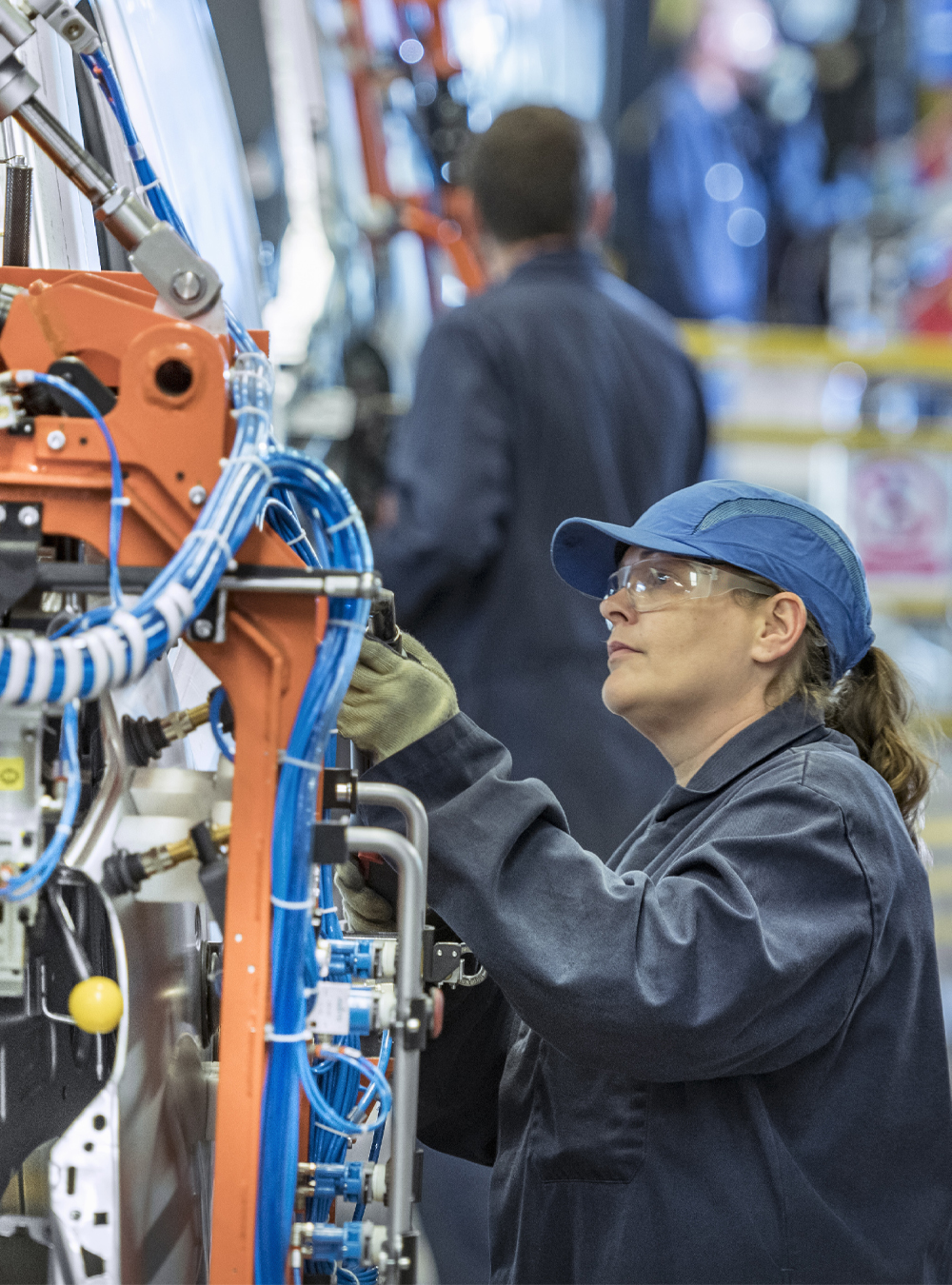
- Nationswell
- Future of work
- just transition collaborative

- Nationswell
- Future of work
- just transition collaborative
The insights we’ve gathered can be distilled down to three main strategies:
1. Humanize work for higher retention rates
2. Rethink recruitment to expand your talent pool
3. Tap into the next wave of Gen Z jobseekers
Read on to learn more about these insights, and how to implement them to advance green jobs in your sector.

As the economy evolves in response to environmental and social changes — including the rapid expansion of jobs in response to a shift to “greener” energy sources and products — there is an urgent need to both find and upskill talent, and create inclusive pathways into emerging roles.
Based on research undertaken by a collaborative of partners — Autodesk Foundation, LinkedIn, Workday and NationSwell — we invite you to explore ways in which fresh approaches to recruitment and employee support can help hiring managers to find and retain skilled workers in any business experiencing rapid change and hiring pressures.

Let employees select shifts that works for their lives.
Employers that offering these preferences lowers attrition; because if you’re on the right shift, you simply work better.


Set employees up for success by including more holistic benefits coverage (beyond medical and dental), such as: transportation subsidies, child care subsidies or services, and upskilling opportunities to support their career growth.




Retain and grow talent for your future needs by providing opportunities for their continued education and skills-based career development, including skills needed as the economy shifts in line with global trends.




The Industrial Sewing and Innovation Center (ISAIC) builds opportunities for employees to upskill and evolve into their work day. Once employees pass apprenticeships, they get to participate in ongoing training and education on “Learning Fridays,” including classes offered for free online. Plus, employees can gain credits towards a degree (matriculating course credit options, certificates of completion options) — all within their work hours.
Through this commitment to shared growth, ISAIC has seen a retention bump and are able to attract and train younger, more diverse talent.

- Nationswell
- Future of work
- just transition collaborative

- Nationswell
- Future of work
- just transition collaborative
The insights we’ve gathered can be distilled down to three main strategies:
1. Humanize work for higher retention rates
2. Rethink recruitment to expand your talent pool
3. Tap into the next wave of Gen Z jobseekers
Read on to learn more about these insights, and how to implement them to advance green jobs in your sector.

As the economy evolves in response to environmental and social changes — including the rapid expansion of jobs in response to a shift to “greener” energy sources and products — there is an urgent need to both find and upskill talent, and create inclusive pathways into emerging roles.
Based on research undertaken by a collaborative of partners — Autodesk Foundation, LinkedIn, Workday and NationSwell — we invite you to explore ways in which fresh approaches to recruitment and employee support can help hiring managers to find and retain skilled workers in any business experiencing rapid change and hiring pressures.

Let employees select shifts that works for their lives.
Employers that offering these preferences lowers attrition; because if you’re on the right shift, you simply work better.


Set employees up for success by including more holistic benefits coverage (beyond medical and dental), such as: transportation subsidies, child care subsidies or services, and upskilling opportunities to support their career growth.




Retain and grow talent for your future needs by providing opportunities for their continued education and skills-based career development, including skills needed as the economy shifts in line with global trends.




The Industrial Sewing and Innovation Center (ISAIC) builds opportunities for employees to upskill and evolve into their work day. Once employees pass apprenticeships, they get to participate in ongoing training and education on “Learning Fridays,” including classes offered for free online. Plus, employees can gain credits towards a degree (matriculating course credit options, certificates of completion options) — all within their work hours.
Through this commitment to shared growth, ISAIC has seen a retention bump and are able to attract and train younger, more diverse talent.

Industry is evolving fast in response to environmental and social changes, and opportunities require new skills and more employees — but it can be hard to find the talent you need. Many job seekers find listings for emerging roles hard to navigate — not knowing where to look, and not realizing they are eligible without guidance. Rethinking how you approach recruitment to be more transparent and inclusive is an effective way to open up your prospective talent pool and honor your diversity, equity and inclusion commitments. Consider these opportunities to help you find more talent.

Make sure your hiring managers are speaking to direct colleagues and managers for the roles in questions, to create clear and realistic job descriptions that spell out what skills and experience you require and the compensation you offer.


To mitigate perceived risk on assessing talents’ fit for open positions, work closely with community partners, who offer people hard and soft skills training and hands-on experience to prepare them for a position in practice.


Paid apprenticeships are an effective way to create entry level positions. Work with local workforce development agencies, dedicated training organizations or educational institutions to co-fund paid on-ramps for a wider set of talent.




Coalfield Development offers a 3 year program with a unique 33-6-3 approach: providing job seekers with 33 hours of work, 6 hours of course work towards an associates degree, and 3 hours of support for personal development — allowing them to train, grow and match up to the industry demand for skills plus experience and soft skills.
“Potential employers like our job model because we can prove they have the ability to apply their skills. Then they will work with them with certification but getting experience in the field is the first step.”
— Brandon Dennison, CEO, Coalfield Development

TalentEI is helping address perceived labor shortages by finding the right fit for both hiring managers and job seekers and showcase the ROI of skills-based hiring practices. This human centered approach streamlines hiring practices while increasing success and retention rates for businesses by enabling workers to find good-paying jobs that are the right skill and workplace fit for them.

Industry is evolving fast in response to environmental and social changes, and opportunities require new skills and more employees — but it can be hard to find the talent you need. Many job seekers find listings for emerging roles hard to navigate — not knowing where to look, and not realizing they are eligible without guidance. Rethinking how you approach recruitment to be more transparent and inclusive is an effective way to open up your prospective talent pool and honor your diversity, equity and inclusion commitments. Consider these opportunities to help you find more talent.

Make sure your hiring managers are speaking to direct colleagues and managers for the roles in questions, to create clear and realistic job descriptions that spell out what skills and experience you require and the compensation you offer.


To mitigate perceived risk on assessing talents’ fit for open positions, work closely with community partners, who offer people hard and soft skills training and hands-on experience to prepare them for a position in practice.


Paid apprenticeships are an effective way to create entry level positions. Work with local workforce development agencies, dedicated training organizations or educational institutions to co-fund paid on-ramps for a wider set of talent.




Coalfield Development offers a 3 year program with a unique 33-6-3 approach: providing job seekers with 33 hours of work, 6 hours of course work towards an associates degree, and 3 hours of support for personal development — allowing them to train, grow and match up to the industry demand for skills plus experience and soft skills.
“Potential employers like our job model because we can prove they have the ability to apply their skills. Then they will work with them with certification but getting experience in the field is the first step.”
— Brandon Dennison, CEO, Coalfield Development

TalentEI is helping address perceived labor shortages by finding the right fit for both hiring managers and job seekers and showcase the ROI of skills-based hiring practices. This human centered approach streamlines hiring practices while increasing success and retention rates for businesses by enabling workers to find good-paying jobs that are the right skill and workplace fit for them.

The US economy is in a period of innovation, with the reshoring of manufacturing and energy industries and the shift into a “greener” economy. However, the average age of highly-skilled workers in the USA is 56. In order to grow and stay relevant, industries need to attract and retain younger talent — with a particular focus on Generation Z (‘Gen Z’) i.e., those born between 1997-2012, and statistically the most diverse generation to ever enter the American workforce. Consider these three opportunities to cultivate the next generation of skilled workers.

Gen Z has a strong desire for frequent feedback loops and interaction with their managers: two-thirds of Gen Z say they need feedback from their supervisor at least every few weeks in order to stay at their job.




Ensuring and promoting that employees have access to safe jobs with opportunities for economic mobility will draw more diverse talent into the industry.




Gen Z has a desire to give back. Creating opportunities for your employees to take action and get involved locally — by helping their community, learning from different generations, deepening local skills and crafts — can help you attract and retain younger jobseekers.




The Industrial Commons “founds and scales employee owned social enterprises and industrial cooperatives, and supports frontline workers to build a new southern working class that erases the inequities of generational poverty and builds an economy and future for all.” Their work involves creating opportunities for younger generations to learn trades and transferable skills from experienced workers in their industry. Focused on the rural South, The Industrial Commons takes a place-based approach to reviving bespoke furniture crafts that are reshoring to their community, and describe this model as a “deep sectoral strategy, overlaid with deep geographical and regional strategy.”

The US economy is in a period of innovation, with the reshoring of manufacturing and energy industries and the shift into a “greener” economy. However, the average age of highly-skilled workers in the USA is 56. In order to grow and stay relevant, industries need to attract and retain younger talent — with a particular focus on Generation Z (‘Gen Z’) i.e., those born between 1997-2012, and statistically the most diverse generation to ever enter the American workforce. Consider these three opportunities to cultivate the next generation of skilled workers.

Gen Z has a strong desire for frequent feedback loops and interaction with their managers: two-thirds of Gen Z say they need feedback from their supervisor at least every few weeks in order to stay at their job.




Ensuring and promoting that employees have access to safe jobs with opportunities for economic mobility will draw more diverse talent into the industry.




Gen Z has a desire to give back. Creating opportunities for your employees to take action and get involved locally — by helping their community, learning from different generations, deepening local skills and crafts — can help you attract and retain younger jobseekers.




The Industrial Commons “founds and scales employee owned social enterprises and industrial cooperatives, and supports frontline workers to build a new southern working class that erases the inequities of generational poverty and builds an economy and future for all.” Their work involves creating opportunities for younger generations to learn trades and transferable skills from experienced workers in their industry. Focused on the rural South, The Industrial Commons takes a place-based approach to reviving bespoke furniture crafts that are reshoring to their community, and describe this model as a “deep sectoral strategy, overlaid with deep geographical and regional strategy.”
- Nationswell
- Future of work
- Just transition collaborative


- Nationswell
- Future of work
- Just transition collaborative
- Nationswell
- Future of work
- Just transition collaborative


- Nationswell
- Future of work
- Just transition collaborative
